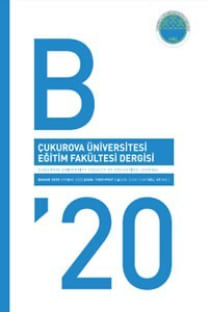Sözlü İletişim Startejileri Öğretimine Farklı Bir Bakış: Sözlü İletişim Starejilerini Örtük Olarak Öğrenmek Mümkün mü?
Bu çalışmanın amacı, öğrencilerin İngilizce öğretmenlerinin kullandığı stratejileri modelledikleri düşünülerek iletişim stratejilerinin örtük bir şekilde öğrenciler tarafından öğrenilip öğrenilmediğini araştırmaktır. İngilizce sınıfları bağlamında, İngilizceyi ikinci dil olarak öğreten öğreticilerin iletişim stratejilerini sınıfta kullandıkları düşünülmektedir. Alan yazında strateji öğretiminin açık bir şekilde yapılması yönünde bir görüş birliği olsa da, örtük strateji öğrenimi üzerine yapılmış bilimsel bir çalışmaya rastlanılmamıştır. Bu nedenle, bu çalışma, İngilizce öğretmenlerinin kullandıkları farklı iletişim stratejilerinin öğrencilerin kullandıkları iletişim stratejilerinin ne kadarını yordadığını araştırmayı amaçlamıştır. Çalışma için hem nitel hem de nicel veri toplama araçları kullanılmıştır. Nicel veri için katılımcıların "Sözlü İletişim Stratejileri Envanteri"ni doldurmaları istenmiştir. Diğer yandan nitel veri yapılandırılmış görüşme yoluyla toplanmıştır. Sonuçlar, öğretmenlerin sınıflarında iletişim stratejilerini kullanmadıklarını; kullandıkları stratejilerinin dili kolaylaştırma gibi öğretme stratejileri olduğunu ortaya koymuştur. Daha derine inildiğinde, öğrencilerin kullandığı stratejilerden öğretmen modellemesi kaynaklı olduğu tespit edilen tek stratejinin "mesajı bırakmama" stratejisi olduğu gözlemlenmiştir. Çalışmanın sonucunda -alan yazına paralel olarak- öğrencilere strateji eğitiminin açık olarak verilmesi gerektiği sonucuna varılmıştır
Further Questioning Oral Communication Strategy Instruction From a Different Perspective: Is Implicit Learning Possible?
This study aims to investigate whether it is possible to learn communication strategies (CSs) implicitly through EFL teachers' modeling. In the context of EFL classrooms, nonnative EFL teachers are supposed to use CSs through which they are also supposed to model the CSs in their classes. Although the literature has an agreement on the fact that strategy training should be explicit, there is no empirical study found focusing on implicit strategy training. Therefore, this study aims to investigate to what extent EFL teachers' use of different communication strategies in the classroom predicts the communication strategies by students. The data of the study was collected by means of quantitative and qualitative data. As for quantitative data, participants were asked to fill into Oral Communication Strategy Inventory (OCSI). For the qualitative data, on the other hand, data was collected through structured interviews. The results indicated that EFL teachers do not model CSs because their strategies in use are rather teaching strategies like simplifying the language. When specifically analyzed, the only CSs explained by EFL teachers' use was message abandonment strategy. The implication of the study is that explicit strategy training should be provided for students' acquisition of these strategies, which is consistent with the literature
___
- Bialystok, E. (1981). The role of conscious strategies in second language proficiency. Modern Language Journal, 65, 24-35.
- Canale, M. & Swain, M. (1980). Theoretical bases of communicative approaches to second language teaching and testing. Applied Linguistics, 1, 1-47.
- Cohen, A. D., Weaver, S. J., & Li, T.-Y. (1996). The impact of strategies-based instruction on speaking a foreign language (Research Report). Minneapolis, MN: University of Minnesota, National Language Resource Center.
- Dörnyei, Z. (1995). On the teachability of communication strategies. TESOL Quarterly, 29, (1), 55-85.
- Dörnyei, Z., & Scott, M. L. (1997). Communication strategies in a second language: Definitions and taxonomies. Language Learning, 47, (1), 173-210.
- Gass, S. M., & Selinker, L. (2008). Second Language Acquisition. New York: Routledge.
- Kavasoğlu, M. (2011). Oral communication strategies used by Turkish students learning English as a foreign language: the development of "oral communication strategy inventory." (Unpublished masters thesis). Mersin University, Mersin.
- Macaro, E. (2006). Strategies for language learning and for language use: revising the theoretical framework. The Modern Language Journal, 90, 320-337.
- Mitchell, R., Myles, F., & Mardsen, E. (2013). Second Language Learning Theories. New York: Routledge.
- Nakatani, Y. (2005). The effects of awareness-raising training on communication strategy use. The Modern Language Journal, 89, (1), 76-91.
- Nakatani, Y. (2010). Identifying strategies that facilitate EFL learners’ oral communication: A classroom study using multiple data collection procedures. The Modern Language Journal, 94, (1), 116-136.
- O’Malley, J. M., Chamot, A. U., Stewner-Manzaneres, G., Russo, R. P., & Küpper, L. (1985). Learning Strayegy Applications with students of English as a second language. TESOL Quarterly, 19, (3), 557-584.
- Oxford, R. L. (1989). Use of language learning strategies: A synthesis of studies with implications for strategy training. System, 17(2), 235-247.
- Plonsky, L. (2011). The effectiveness of second language strategy instruction: A meta-analysis. Language Learning, 61(4), 993–1038.
- Selinker, L.(1972). Interlanguage. International Review of Applied Linguistics, 10(3), 209-230 Tarone, E. (1981). Some thoughts on the notion of communication strategy. TESOL Quarterly,15, (3), 285-295.
- Williams, M., & Burden, R. L. (1997). Psychology of Language Teachers. Cambridge: Cambridge University Press.
- Yaman, Ş., Kavasoğlu, M. (2013). The adaptation study of oral communication strategy inventory into Turkish. International Journal of Human Sciences, 10 (2), 400-419.
- ISSN: 1302-9967
- Yayın Aralığı: Yılda 3 Sayı
- Başlangıç: 2000
- Yayıncı: Çukurova Üniversitesi Matbaası
Sayıdaki Diğer Makaleler
Meryem ÖZDEMİR-YILMAZER, Esra ÖRSDEMİR
Süreç Odaklı Yazma Yaklaşımlarının Yazma Başarısına Etkisi: Bir Meta Analiz
Özlem BAYRAK CÖMERT, Hasan Basri KANSIZOĞLU
Sercan Özen, S. Güzin MAZMAN AKAR, Mehmet Barış Horzum
Teachers’ ICT Skills Scale (TICTS): Reliability and Validity
Yalın Kılıç Türel, Tuncay Yavuz ÖZDEMİR, Filiz VAROL
Democratic Citizenship Attitude Scale: A Validity and Reliability Study
Cengiz YILDIRIM, Adil TÜRKOĞLU
The Effect of the Process Approach on Students’ Writing Success: A Meta-Analysis
